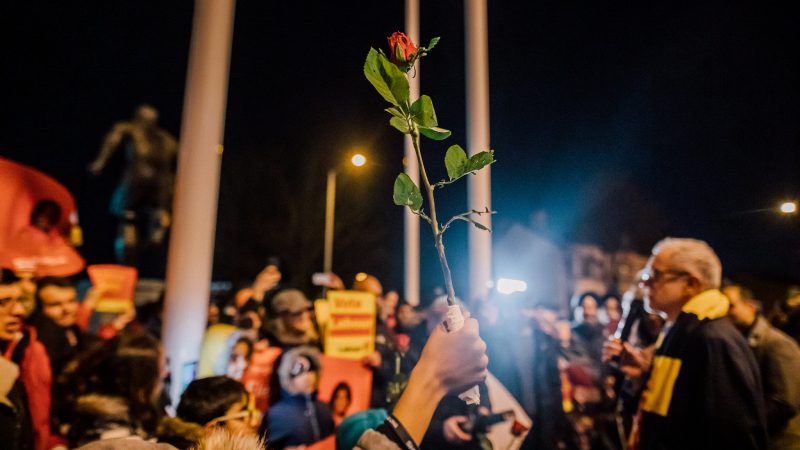
The purpose of Labour is to be in government to create a better society. We have passed up on that elementary task at the last four opportunities. A record fifth straight loss would be an unprecedented disaster for the party and the country. Even with the polls as they are now, after Tory blunder after Tory blunder, the best we can hope for is a hung parliament. Of course, we can hope Johnson keeps on shooting himself in the foot or is replaced by someone even worse, but I wouldn’t bet on it. The 125 seats needed to win a majority of just one still look miles off. So, what to do?
Compass is launching a campaign to help make Keir Starmer Prime Minister – it’s called Only Stand to Win. The campaign is to get Labour to change its rulebook so that its Constituency Labour Parties (CLPs) would decide whether they stand a candidate or not. In the vast majority of cases, it makes complete sense for Labour to stand, but not everywhere. A small and simple rule change that deepens party democracy could be the thing that gets Labour over the line and into No 10. Here is why and how.
The harsh electoral truth is that in some 80 seats it is the Liberal Democrats that can beat the Tories, not Labour. Standing aside in at least some of those seats will help ensure a Lib Dem win, deny a Tory victory and allow all Labour’s resources in such seats to be applied to the nearest seat where Labour can win. It could also pressure the Liberal Democrats to reciprocate and clear the path for Labour in many more seats. If a way could be found to include the Greens in the 30 seats where their now bigger vote makes them a king-/queen-maker in return for support for them elsewhere, then even better.
Of course, it’s always a little more complicated. Sometimes Labour standing does help a Liberal Democrat, as it allows them to win over necessary soft Tories. In some Labour seats, a Lib Dem standing helps our party through the same shift – think Canterbury. And sometimes it’s hard to tell who is best placed to win. Look at the recent North Shropshire by-election, where Labour looked best placed to challenge given the raw numbers but was already at the ceiling of its vote. Only the Lib Dems could inflict such a big defeat on the Tories there.
This is why local decisions matter. Party members know the reality of their vote, its trend, where it might be soft or hard and who the real Tory challenger is. They should be allowed to decide whether to use their time and resources in an effort, however paper thin, that will almost certainly draw wasted votes to them, and that could have been targeted more effectively elsewhere in a seat Labour can win.
Standing to win will benefit Labour far more than any other party, allowing the formation of a minority Labour-led government that can be sustained through the introduction of proportional representation. This is clearly the kind of deeper democracy Labour Party members want given the vote on electoral reform at conference, and would ensure that, as soon as everyone’s vote counts, the party can stand everywhere all the time.
Of course, there are strong objections to such a rule change. Labour, it is asserted, is a national party and stands everywhere. Sadly, that is an assertion that doesn’t bear the scrutiny of the many places Labour can no longer hope to win. Objectors also claim that people have the right to vote for their party of choice. But this ‘right’ is meaningless in so many places under first-past-the-post. It is the electoral system that denies millions of Labour voters a meaningful choice.
Finally, of course, the argument goes that the Lib Dems are ‘yellow Tories’ and can’t be trusted. To that, I can only say: look at how they are positioning themselves. They have been vehemently anti-Boris Johnson, and Ed Davey has said time and again he won’t back him. Ultimately, though, this is about the risk of trust. We can either be forever bound by memories of the coalition years, as Lib Dems can be with us over Iraq, or we can move on to a non-Tory world. The only winners if we stick in the past are the Tories, as they do their deals with Reform UK.
The soft option is to stand but not campaign. Given their appearances (or otherwise) at recent by-elections, I believe it’s clear that Starmer and Davey have a private by-elections pact. But this simply won’t work in the melee of a general election. Voters are not blocks to be shifted around by party HQs. They have their own minds. But they need help and political leadership – that’s what political parties are for.
In 2019, there were 60 progressive tragedies where progressive parties won the majority of votes but lost the seat. Next time, in a tighter race, we cannot afford for this to happen again. These are the seats in which Labour cannot win but the Tories can lose. By standing, Labour helps split the anti-Tory vote and wastes scarce resources being deployed nearby where Labour can win.
By having the local power to decide whether to stand a candidate or not, local Labour parties can, where it is sensible, maximise the anti-Tory vote where Labour can’t win and maximise the pro-Labour vote where it can. It’s a simple choice.
Only Stand to Win will be launched at an online meeting at 6pm on 26th January. Speakers include Labour MPs Jon Cruddas and Clive Lewis. Find more details here.




More from LabourList
Letters to the Editor – week ending 15th February 2026
‘Labour council candidates – it’s tough, but all is not lost’
‘Labour won’t stop the far right by changing leaders — only by proving what the left can deliver’